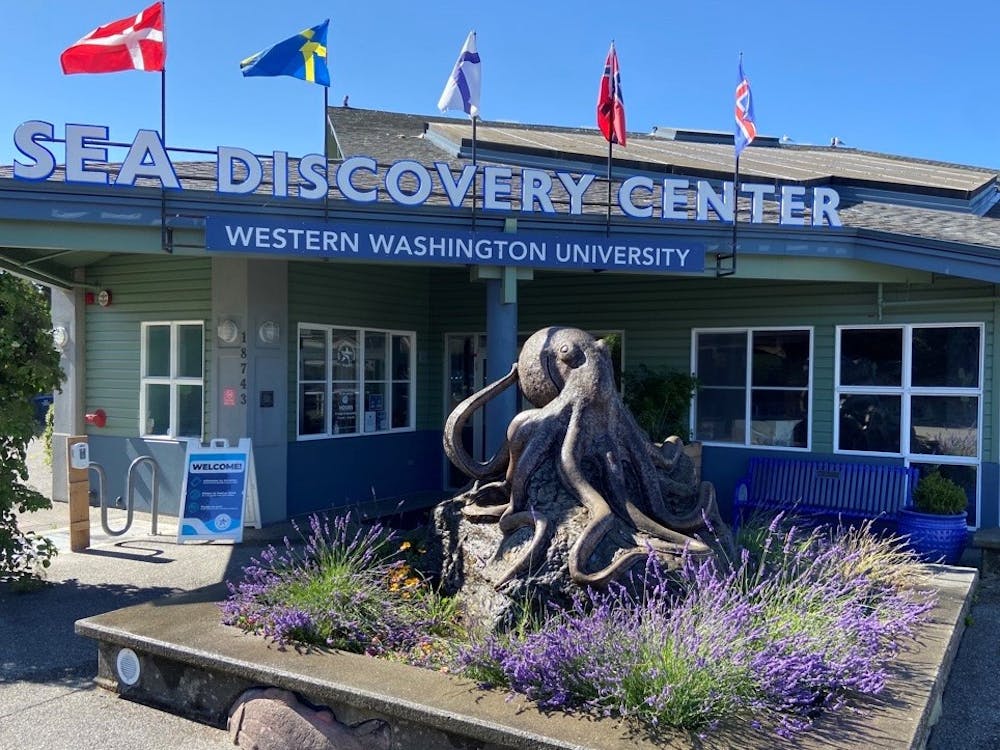94 miles from Western Washington University’s campus lives the SEA Discovery Center, a self-sustaining entity of Western in Poulsbo. This institution acts as the only aquarium for the community stretch of Port Townsend to Seattle, educating up to 25,000 visitors a year.
The SEA Discovery Center, originally called the Poulsbo Marine Science Center, is located on the waterfront of Liberty Bay. The center has been around for over 50 years, creating a long history in the community. It faced many ups and downs throughout the years, eventually leading the center to be gifted to Western’s campus in 2016.
The center focuses on educating and engaging the community. To fund these efforts, it receives a portion of its budget from Western, with the remainder coming from fundraising and donations. Unlike other aquariums, admission is free to the public.
“Because of where we're physically located, it gives access, that's one of the big things is we give access to people that maybe can't get to Seattle, can't afford Seattle Aquarium, we're free,” said Bridget Anderson, director of operations and outreach at the SEA Discovery Center. “We want to be accessible to as many people as possible.”
The center is a part of a community of marine centers of the Salish Sea. For the SEA Discovery Center, this means they focus on educating the community on Salish Sea animals and the habitats that surround them. Anderson said their mission is to “inspire stewardship of the Salish Sea.”
One of the ways the aquarium supports education within the community is by offering volunteer and experience opportunities for college students, many a part of Western Washington University Center at Olympic College.
Andy Garcia, a third-year student at Olympic College and a volunteer at the SEA Discovery Center, discussed how the program has allowed him to dive into his future career and learn more about marine science.
“It's a great way to further your knowledge in marine science if that's what you're interested in, but it's helped me as a student because it's helped me build community. It's helped me build a sense of leadership and teamwork,” Garcia said.
Students from various programs at Olympic College, including those in environmental science, computer science and cybersecurity, also utilize the center to learn about water quality testing or create software development initiatives.
Along with supporting higher education, the center also supports the youth in the community. The center has been doing fifth- and sixth-grade field trip visits since they opened.
After a more than 50-year existence, the center has started to see some of these previous field trip students return decades later as visitors.
“I just had somebody come through the other day who was a contractor and he was like, ‘Yeah, I came here on my field trip in fifth grade. This is great to see it back open,’” Anderson said.
Aquariums like the SEA Discovery Center are important for providing hands-on experience to create a greater educational impact on visitors.
“I'm a firm believer that if you experience something first-hand, it's going to resonate more with you, it's going to have a bigger impact on you, than if somebody just tells you or you read about it, or you watch a YouTube video,” Anderson said.

Two young visitors observe the Moon Jelly exhibit at the SEA Discovery Center in Poulsbo, Wash. on Sept. 2, 2022. The Moon Jelly is just one of the Salish Sea animals the center is home to. // Photo courtesy of SEA Discovery Center
These public facilities are crucial for informing visitors of environmental and conservation issues. While aquariums act as fun experiences, according to a study by Roy Ballantyne and Jan Packer, 76% of visitors believed providing information about conservation and environmental issues at zoos or aquariums is just as or more important.
The study also found that respondents believe the most important role of zoos and aquariums is to provide information about the animals and “encourage visitors to reflect on, and take action in relation to, such issues” like environmentalism and conservation.
“They're really important when it comes to that because aquariums show a side of the environment that we're not used to seeing, and it can really show people what there is to care for and what we need to help save,” Garcia said.
The SEA Discovery Center looks to do just that for its visitors.
“I think that there's a lot of animals and habitats that are being destroyed and if we're able to show the value and importance of them and why they're so precious, our hope is that more people will do more to protect them,” Anderson said.
Madison Linney (she/her) is a campus news reporter for the Front. She is a fourth-year BA marketing major with a minor in public relations. In her free time, she enjoys spending time with friends and family, going to the gym and exploring new places. You can reach her at madisonlinney.thefront@gmail.com.






